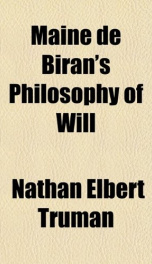maine de birans philosophy of will

Purchase of this book includes free trial access to www.million-books.com where you can read more than a million books for free. This is an OCR edition with typos. Excerpt from book: SECTION III. Biran's Relation To Earlier Thinkers : Locke, Condillac, Kant, And Reid. Before considering Maine de Biran's philosophy in detail, it is well briefly to review the work of his direct predecessors in reference to the special points in which their opinions are related t6 the principle which he makes ultimate. This reference will show the nature of the philosophical thought which was dominant in France in his time, and also the specific manner in which he reacted against the current sensationalism; it will enable us to estimate his position at the beginning of his career, and also to determine the extent of his development. Comparison with the historical environment will lend distinctness to his leading ideas and will make it possible to determine more exactly the significance of their application in his system. With this end in view we shall attempt to trace the idea of the activity of the self as it is found in the work of Locke and of Condillac. But in this connection the treatment can be no more than a mere outline ; and naturally cannot include even the mention of many important elements in the views of these philosophers. At this point we may notice a definition of sensationalism.l Cousin, who found it congenial and advantageous2 to call himself a disciple of Biran, brought the name into use. With him the term designated the least developed of the four common philosophical positions. The three types of thought correlative with it were idealism, skepticism, and mysticism.3 He employed it to characterize the school tof Condillac. But in a wider sense it has been applied to various thinkers, sometimes to denote a materialistic metaphysics, at other times an empirical epistemology, or finally a hedonistic ethics. Especially in the second of these senses the...
Info about the book
Author:
Series:
Unknown
ASIN:
B008HLLM8I
Rating:
2.5/5 (4)Your rating:
0/5
Languge:
English
Users who have this book
Users who want this book
What readers are saying
What do you think? Write your own comment on this book!
write a commentGenre
if you like maine de birans philosophy of will try:
Other books by this author
Do you want to read a book that interests you? It’s EASY!
Create an account and send a request for reading to other users on the Webpage of the book!


